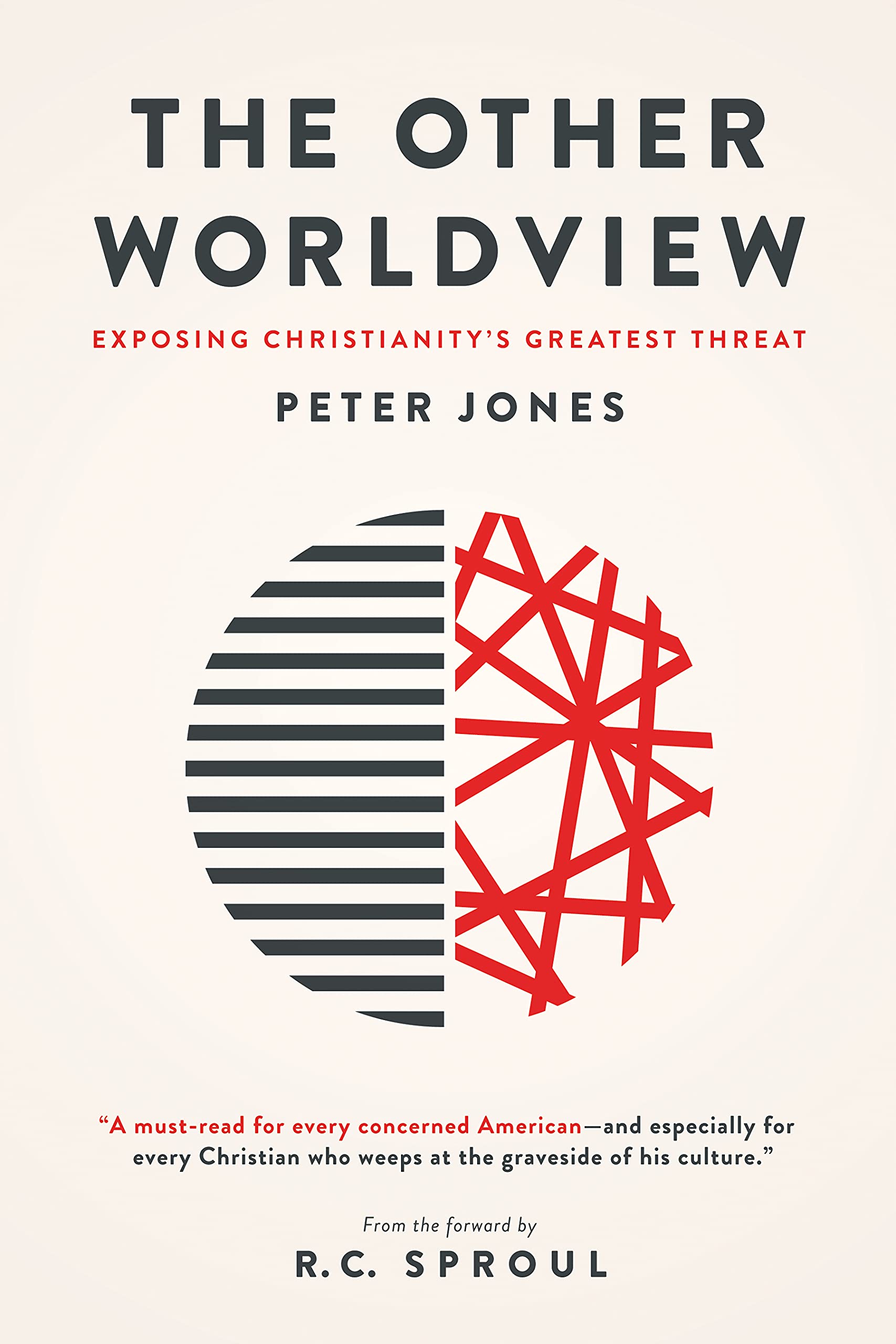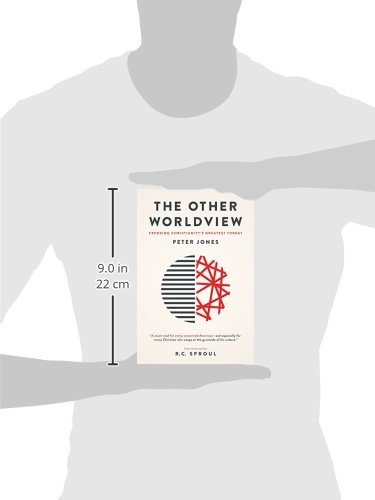Customer Services
Copyright © 2025 Desertcart Holdings Limited



The Other Worldview: Exposing Christianity's Greatest Threat
K**T
An accurate depiction of our times with the right and only solution
Peter Jones covers some extensive ground to uncover the pagan roots of the West’s obsession for liberating our conscience from guilt and accountability to any outside form of authority. In doing so he shows the carnage throughout history and the continuing threat we now presently face. The distinction between Creator and creature is essential to our being human. The amazing reality of the Incarnation is our only hope of solving the problem of conscience and guilt which truly exists for our hope of reconciliation to the One and only true God who is NOT us but is Holy Other, yet near to all. Made to be like Him, though not to be Him, is the joy of what Christ came to accomplish. And He did it perfectly.
C**Y
Essential read for helping followers of Jesus understand the modern worldview divide
Christians today often look around the world and complain about the way it is today, but it is important for us to understand why things are the way we find them. Mr. Jones’ book provides a good analysis of some of the shifts in society of the last 100 years and the significant ways that these shifts have moved away from a Biblical understanding of the world. I would recommend this book to all Christians who hold to Biblical truth and want to follow the Christian mandate to engage with the world and share the hope of Christ.
B**L
Ouroboros Returns: A Comprehensive Review of "The Other Worldview"
“The Other Worldview,” published in 2015 by Peter Jones, unveils the subversive undercurrents of Eastern spirituality in Western thought and culture and declares the advent of the postsecular West. Jones draws a line from the gnostic paganism in the early Church to its current, resurrected form in the writings of Carl Jung. Jung, under the influence of Hindu and Buddhist spirituality, conceives of reality as fundamentally one uniform whole—both in the things that are seen and the things that are unseen. Contradistinctively, Jones argues for the biblical conception of reality as fundamentally distinguished between two facets: the Creator and the created. Jones then traces the influence of the Jungian conception of reality from the sexual revolution of the Sixties onward expressed it to the paganistic morality and practices of spiritual deviants also taking root at that time. Jones calls paganism the “perennial philosophy,” but Jung called it the “Great Work… [of] perfect emancipation of [the human] will.”And here’s the upshot: Paganism never went away. Christianity, particularly state-sanctioned Christianity, merely suppressed paganism since its advent in Western civilization at the time of Constantine’s conversion. Hence, together with prominent scholars both secular and Christian (and every gradation in-between), Jones proclaims the end of the secular age and the dawn of the postsecular, in which neither Christianity nor hard materialism (atheism) have a stake. The postsecular West divests itself of Christianity while appropriating Christendom’s moral aspirations in order to marry them to a new kind of rational thinking in which the spiritual takes centerstage, the gravitational center becoming the deific Self. This is the “Oneist” worldview, as Jones terms it, in which the Self becomes its own creator and the universe becomes the subject of the Self. In short, what defines the postsecular West is a conjoined good and evil, a new and viciously liberated morality; namely, the self-devouring serpent, Ouroboros.Opposed to this, Jones argues then for what he calls a “Twoist” worldview that upholds the Creator-created distinction while still acknowledging and celebrating the mystery of the incarnation of Christ as the ultimate revelation of that distinction and the Creator’s redemptive purposes in creation. Jones advocates for holy “living” and “thinking” as a curative for paganistic “Oneist” ideology, while at the same time acknowledging that the days when Christians could assume their neighbors know what biblical, theological terms such as “Gospel,” “Jesus Christ,” “God,” and even “man” mean—those days are gone for the West. Jones asserts such assumptions are already wholly banished in the West, and it wasn’t the usual Christian punching bags of “materialism” or “postmodernism” that banished them, but rather a new breed—really an old breed—of religion. This new religion elided the Creator with the creature, making them the same. Thereby, the West became satisfied with a markedly paganistic interpretation of morality rationalized in pseudoscientific jargon and steeped in self-idolatry. Jones, while identifying the cure for this in biblical distinctions of Creator and created, does not specifically apply the cure. Instead, he advises seeking God’s wisdom as to “how to speak his truth faithfully and courageously in the difficult days ahead.”One wonders how Jones might have written “The Other Worldview” today. Shortly after its publication, Jordan B. Peterson, a disciple of Jung, received widespread attention in 2016. Christian men both nominal and devout praised his practical insights on life, knowingly or unknowingly imbibing Jung’s ideology. Remarkable as Jones’ revelations about the homosexual agenda of the Sixties and Seventies are, it seems his warning is too-little, too-late for many in the Church. Too often, the Church seems to fixate on the boogeymen of atheism or postmodernism, battling passe enemies which, according to Jones, the new enemy is already diligently tearing down.On the popular level, Jones does competently in revealing the insidious undercurrents of the paganism in our time without resorting to hysterics or sensationalism, but he would have benefited from a more succinct approach. The first part of his book hits all the right beats. Wisely Jones highlights both the decline of pure secularism and popular Christianity’s indefensible preoccupation with it, and this may be the most important contribution of this book. Secularism was never here to stay, and the pure materialist of today is gradually becoming the pagan of tomorrow, welcoming ever gradation of flexible morality. Today, pagan tolerance shows its true face after several short decades of feigned kindness, establishing itself as the inviolable principle and entirely content with its self-contradictions. As Michael Polanyi once wrote, “Scientific skepticism and moral perfectionism had for some time been growing more radical and more irreconcilable, and more deeply ingrained in our thought; and eventually they fused into various unions, each of which embodied a dangerous internal contradiction.”The latter two thirds of his book should have been much condensed. Jones frequently repeats his favorite quotes and ideas, though he doesn’t fall into the popular trap of an overly anecdotal approach. The solution he presents—“living and thinking holily and biblically”—would have a fuller impact if he applied it more rigorously. How ought we to answer the rising paganism? How might we wisely undermine? What practical tools does the Church have to chase away the scavenging birds (cf. Gen 15:11)? Jones’ emphasis on the incarnation of Christ is exceedingly important, and I would have loved to see a more theological approach to how Christ’s incarnation confounds the paganistic notion of an essential Creator-creature union. Jones might have then explored the implications of our union with the resurrected Christ, how this union counteracts the insidious temptation to deify man by uniting him subordinally to God in Christ. Lastly, Jones’ use of the term “twoist” seems at times a bit awkward and forced.Overall, Jones important contribution is to be commended. The Church must resist the new Western paganism resisted with all zeal and knowledge, to have the courage to say “God is God, and I am not.” More work is needed today to fully apply the balm of this biblical distinction that reality is fundamentally two, not one. Christians can do this individually by distinguishing paganistic uniformity with true and biblical union to God by faith in Jesus Christ alone.
L**X
Brilliant for all audiences
Fabulous book that helped me see the cohesion behind a lot of seemingly disconnected insanities in the modern world. As a millennial myself, it was particularly enlightening to see how basically the entirety of my public “education” growing up is a deliberate indoctrination worth examining whether one agrees with oneist premises or not. Highly recommend to anyone of any age.
A**Y
A tremendous dealing with the influences of contemporary ideas!
I highly recommend this book if you want to be a sharp-minded thinker and effective communicator of the gospel in our world. Thank you, Peter. Well done.
F**T
Putting a finger on it
Must read for any believer plagued by the sense something's amiss. Not that it's the whole story but goes quite far, and eloquently, in putting a finger on the what's and where's and why's of that often nebulous feeling all is not right with Western Evangelicalism. He a fine Christian thinker.
M**A
Thorough study about the decline of Western civilization.
Great study on the cultural situation of the Westerns civilization. Pastor Jones makes an in-depth analysis on the cultural decay we are experiencing for some decades now. He, brilliantly, gives us the biblical resources and a myriad of references that make his work even more profound. A must read for all Christians. We must know and engage the world we live in.
N**G
Reveals how mysticism and pagan practices were subtlely introduced into Christianity
Growing up the 1960s, I now look back and see how Jungian psychology influenced my understanding (or lack thereof) of Christianity. This is a must read to clearly see how Jungian psychology has effected everyone and led us to where we are today with Christianity's embrace of mysticism and pagan practices.
M**E
Essential Reading
Essential reading - probably a lot of reviews say that about books - but this one is essential reading for those who wish to think deeply and carefully about the world we live in and communicating the gospel within it.How are we to make sense of what is happening in terms of people's thinking? Peter Jones suggests that the issue boils down to something very simple: What is reality? Is it One or Two?The book is an analysis of how One-ism (the idea that there is only one entity [matter or spirit, but ultimately only spirit]) has come to dominate thinking, and how it is a fundamental denial of Two-ism (the idea that there is both Creator and Creation) and all its distinctions. This book will make you think--it will join up dots for you in a very helpful way. Why is the current ethos to deny distinctions between male and female? Why are we increasingly incapable of distinguishing right from wrong (or at least articulating it)? Part of the answer is that the whole fundamental issue of there being this and that, Creator and creature, or there even being distinctions is under attack.After analysing it, and showing the pervasiveness of it, almost causing you to despair, Jones proposes how Christians are to live in such a world. And wonderfully and gloriously the solution is simple and biblical. I will leave it there, but I found his closing section in which he shows that it has always been thus and that how Paul addressed the Roman Christians still applies today, wonderfully helpful and encouraging.
K**Y
... how modern beliefs differ from those of conservative evangelicals like the author
The first section of this book offers an interesting analysis of the origins of contemporary spirituality and of how modern beliefs differ from those of conservative evangelicals like the author. However, as somebody who has moved gradually from evangelicalism to a more liberal position I found that both the tone and content of the book (especially the later parts) simply convinced me that I was right to make the change.
Trustpilot
3 weeks ago
1 week ago